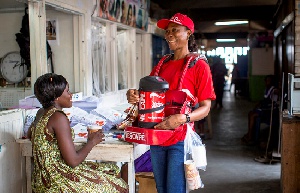 International Coffee Day is a global celebration that highlights the importance of coffee
International Coffee Day is a global celebration that highlights the importance of coffee
For over 250 years, Coffee has evolved to become part of many cultures, livelihoods, and economies around the world.
According to a study by the International Coffee Organization (ICO), coffee accounts for the primary source of income for more than 10 million households in 25 African coffee-growing countries. The study further estimates that the global demand for coffee will increase by more than 10 million metric tons by 2020.
International Coffee Day is a global celebration that highlights the importance of coffee, raises awareness about sustainable cultivation and fair trade practices within the coffee industry. It is also an opportunity to honour the women and men who grow, harvest the coffee we love and makes the journey of coffee from the farm to our local shops possible.
Nestlé recognises that coffee farmers face many challenges, such as low yields unstable environmental conditions, which affects their livelihoods. To help address these challenges, Nestlé has put in place the Nescafé Plan. Below are 3 ways that Nestlé in Central & West Africa makes sure that the coffee it uses is “Grown Respectfully” to deliver you a great-tasting cup of coffee every day.
Sourced locally
All Nescafé sold by Nestlé in the Central and West Africa region is sourced and transformed locally. To ensure quality supply and improved livelihoods for coffee farmers, the Nescafé plan, a global initiative, harmonizes Nestlé’s commitment and activities towards supporting responsible farming, production and supply, and consumption of coffee.
As part of the Nescafé plan, 18,257 farmers including 563 women in Central & West Africa Region have been trained on the techniques and guidelines on better farming practices. The robust agricultural development framework put in place helps to build capacity of farmers to meet the right quality standards required, and facilitates access to markets.
Sustainable coffee production involves not only appropriate agricultural techniques, but also ensures that other factors such as improved social conditions and farm management are in place.
For Nestlé, sourcing green coffee compliant with Sustainable Agriculture Network (SAN) principles by 2020 is a clear demonstration of its brands living up to the company purpose of: “enhancing quality of life and contribute to a healthier future”. In 2017, Nestlé distributed close to 2.5 million high-yield, disease-resistant coffee plantlets to farmers in Côte d’Ivoire.
Mr. Rémy Ejel, Market Head, CWAR asserts: “Nestlé’s commitments to continuously improve our green coffee supply chain as well as improve workers’ livelihoods and protect children in our agricultural supply chain contributes to our global 2030 ambition to improve 30 million livelihoods in communities directly connected to our business activities.
Manufactured locally
The Nescafé produced by Nestlé in Côte d’Ivoire is distributed throughout the Central & West Africa region. In addition to contributing to strengthening the national economy, the local processing of Ivorian coffee adds value to the crop while creating good manufacturing jobs; key conditions for the sustainable development agenda of the region.
The Nescafé factory provides employment for about 200 people and aims to create shared value in their communities. Earlier this year, the factory financed the refurbishment of a school and furnished library in Makouri in Abidjan. .
Sold locally
To bring the transformed coffee bean from farm to cup, the Nescafé value chain entails a distribution model called ‘My Own Business’ (MYOWBU). It is a scheme initiated by the company, which contributes to employment creation and entrepreneurship opportunities for young people across the region.
Teni Alhassan from Ghana now caters for her family through the sale of Nescafé as a MYOWBU Operator: “On average, I am able to make USD 170 a month out of which I feed, clothe and pay school fees for my family.”
Wasiu Adeyeye, from Nigeria, is one such young person who was introduced to the Nescafé pushcart business by a friend after several unsuccessful attempts to find employment after graduating: “I engaged in the business for seven years, and have been able to a build a house for my family. I continue to provide for the other necessities of life to keep them healthy and happy”.
“Initially, I thought it was not a lucrative endeavor”, he added, “But after plying the trade for three months my perception changed, and I realized that with hard work, dedication and perseverance I can make it”. Teni and Wiasiu attest that selling Nescafé is economically empowering as it promises a very bright future. Astoundingly, their success stories are akin to that of some 3,500 young people that take part in MYOWBU.
Through the MYOWBU scheme, these youth can realise their aspirations. To help them succeed, Nestlé builds their capacity on business management, basic product presentation skills and how to maintain hygiene. For Nestlé, it is paramount to help building a viable coffee value chain in Central and West Africa as it contributes towards the attainment of the UN Sustainable Development Goals linked to reducing poverty, ensuring zero hunger and responsible consumption and production.












